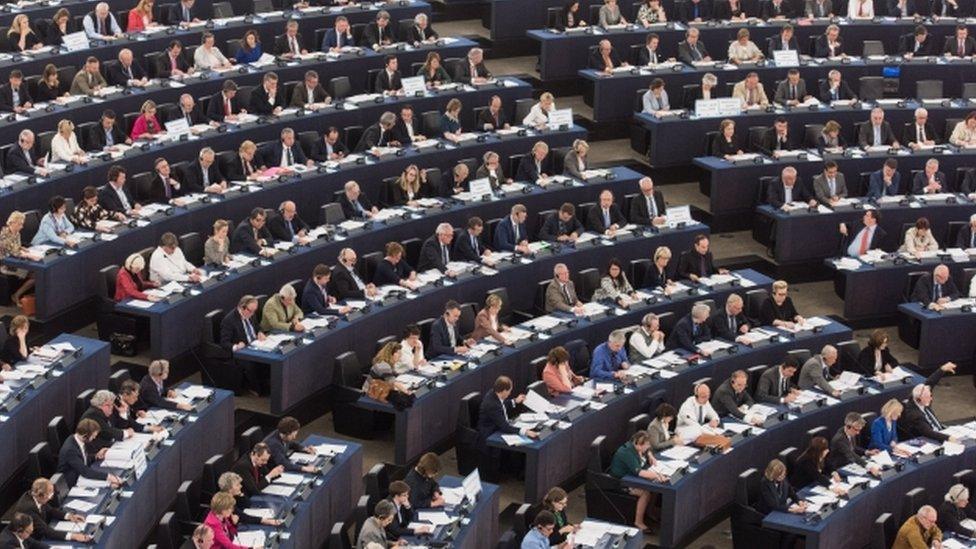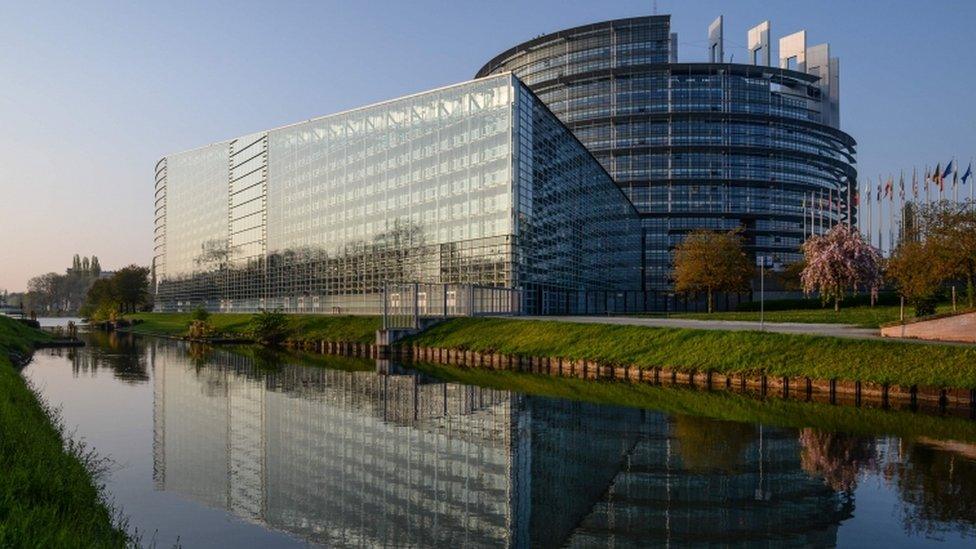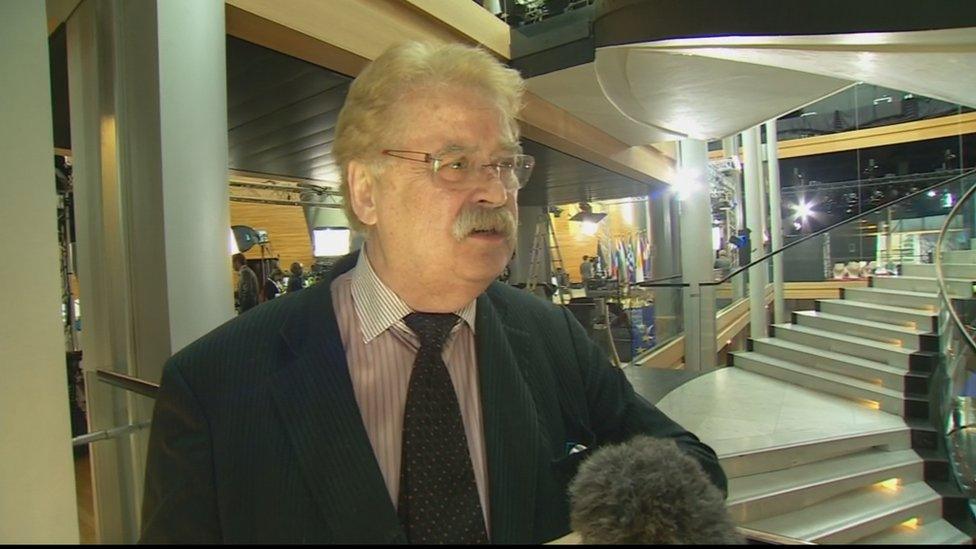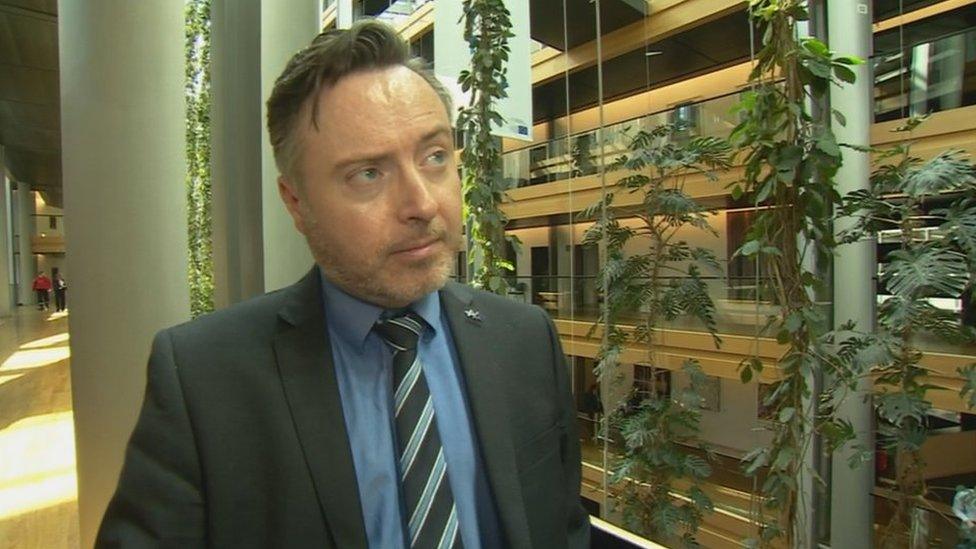Is Europe softening its stance on Scottish independence?
- Published

MEPs set out their objectives for the Brexit negotiations on Wednesday
Large banners hang in the European Parliament building in Strasbourg celebrating 60 years since the Treaty of Rome.
They are visible en route to the chamber where MEPs this week set out their key objectives for Brexit talks over the next two years (MEPs won't be at the top table, but they will have to approve or reject any deals).
Those objectives, devised by leaders of the main parties in the Parliament, are aimed at protecting the EU project in the face of Brexit and rising support for parties across the continent less than enthusiastic about integration.
The priorities can be summarised as:
Brexit must be orderly - Europe wants a negotiated exit
The remaining EU 27 must stick together
The UK must honour its obligations
The UK can't enjoy "similar benefits" to membership when it leaves
The rights of EU citizens should be protected (echoing what the UK government has said, but with little in terms of specifics)
The resolution also notes Scotland and Northern Ireland's electorates voted remain (bids to have recognition of the results in London and Gibraltar were rejected).
On paper, it's little more than stating facts. But the SNP hopes official recognition could prove useful down the line.
"It keeps the door open for later things," says MEP Alyn Smith. "We're not sure what those things are going to be yet, this is the start of a process, we'll keep all options open as long as we can."
No details on what those doors might lead to.
UKIP's David Coburn thinks the EU side is causing mischief - trying to split the UK side ahead of negotiations. "That's just to cause trouble", he says. "They're just trying to stir it up."
Conservative MEP Ian Duncan describes it as primarily "politics", warning: "There will be attempts to divide the UK, we must be united".

Conservative politicians believe some members of the European Parliament will seek to divide the UK during the Brexit process
It was interesting to note some of the figures who mentioned Scotland during the debate.
One was Esteban Pons - the senior Spanish MEP previously seen as someone who would articulate an anti-Scottish independence case from an EU perspective.
His mention was only in passing, but it comes after he told us last month his country wouldn't stop Scotland trying to get back in if it became independent.
His comments have since been backed up by the foreign minister.
Some Conservatives are furious about this. They think the Spanish are playing an aggressive negotiating game and Scotland has been brought into play. Gibraltar is another example, they think.

Elmar Brok believes an independent Scotland could rejoin the EU relatively quickly
Another figure who has been discussing Scotland is Elmar Brok. He's a member of Angela Merkel's CDU and was until recently chair of the foreign affairs committee in the European Parliament (interesting snippet: Mr Brok was educated in Edinburgh. He was replaced in the role by David McAllister, the Scottish-German MEP).
Like Mr Pons, Mr Brok opposes Scotland becoming an independent country. But if it does, he thinks it could become an EU member fairly speedily.
His argument suggests Scotland will have to leave the EU when the UK does - a view echoed by many in Brussels (some in the SNP acknowledge this is likely, though others haven't given up on remaining).
Unofficial vote
But if it wanted back in, the process, he says, could be smooth. Assuming there were no political hurdles (which shouldn't be ruled out), he thinks the technical side would be straightforward.
He points out Scotland already complies with EU law as part of the UK, and dismisses the idea there's a queue it would have to join.
It's worth noting his insistence any independence vote has the backing of London. That's a point the Spanish have made too. That's part of the reason Nicola Sturgeon appears unlikely to hold an unofficial vote.

Alyn Smith and his SNP colleagues believe Europe's opposition to Scottish independence has softened since the Brexit vote
On the face of it, Mr Brok's comments sound like music to the ears of independence supporters. But, argue some, they need to be seen in a wider context.
The Conservatives argue the hypothetical independent Scotland being discussed would have to submit to many unattractive EU demands in exchange for speedy entry back into the club.
Ian Duncan MEP argues the conditions on Scottish entry would involve terms far inferior to those the UK currently has.
"The more you give up, the easier it is to get in", he says. "Getting in on the same terms as the UK, that won't be possible, because the UK rebate is despised across here.
"It could be very very easy if you give up on all the stuff you want to keep".
'Without allies'
He highlights areas that might not be attractive to some Scottish voters, like re-entering the Common Fisheries Policy.
In response the Scottish government's Brexit minister Mike Russell tweeted Mr Duncan was "scaremongering".
And his colleagues in the European Parliament think the EU's attitude to Scottish independence has changed since 2014.
Alyn Smith says: "One member state will back of the government of another member state… the UK is now without the allies it had."
The EU's partnership with the UK has long been a complicated one. Figuring out the future of that relationship - for the UK and for Scotland - could prove just as complex.